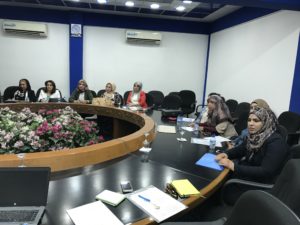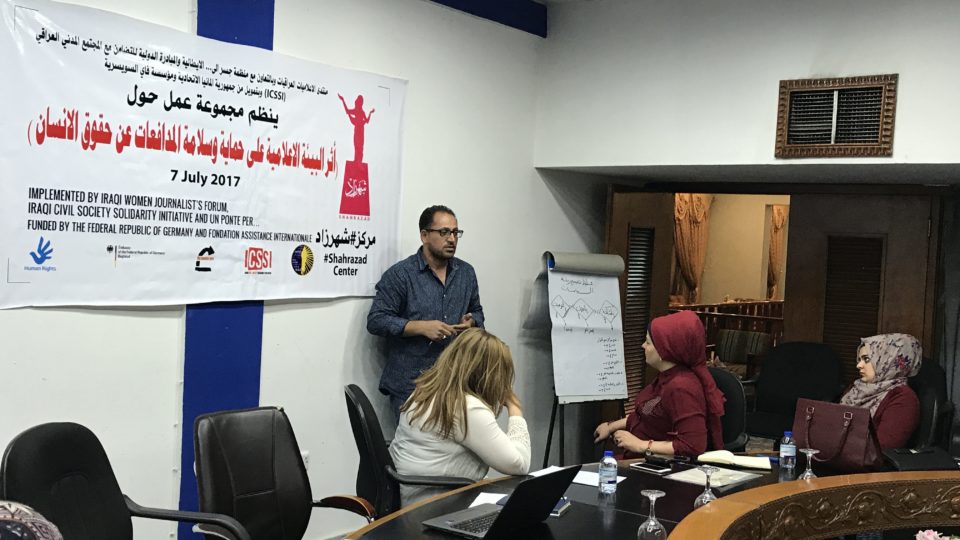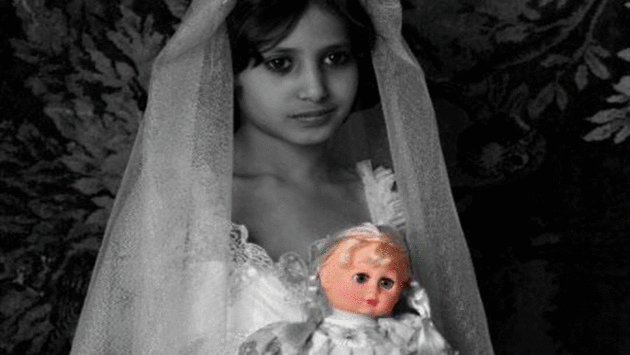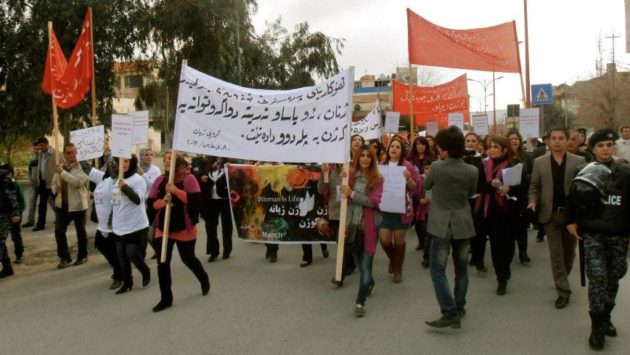Key Factors which Impact the Protection and Safety of Women Human Rights Defenders (WHRDs)

On 7 and 8 July 2017, women activists from across Iraq gathered to participate in two focus groups organized by the Iraqi Women Journalists Forum. These meetings provided participants the opportunity to meet and discuss factors affecting the protection and safety of women human rights defenders (WHRDs). Support for WHRDs is a primary concern for ICSSI’s Shahrazad campaign, and is particularly urgent now given the unstable situation in Mosul, and the more general work done by WHRDs in Iraq over recent months to make sure that national laws provide sufficient protection to women.
During the first focus group, researcher, Diaa Al-Saraiy, reviewed his paper on the impact of the current media environment on the protection and safety of WHRDs in Iraq. He identified some of the most significant problems now faced by WHRDs, including: lack of awareness on the part of decision-makers on issues relating to the work of WHRDs, lack of vision and increased politicization of the media, continued influence of conservative strains found in religious and tribal systems still active in Iraqi society, and a general lack of independence which prevents the media from maturing.
Al-Saraiy highlighted a number of different groups which he explained can be both part of the problem, as well as helpful in finding solutions. In particular, he noted the work of government authorities and officials, private and public media organizations, the legal system, civil society organizations, the United Nations, and other international organizations. After looking at some of the key actors involved, Al-Saraiy formulated several proposals aimed at resolving some of the most pressing problems he found:
– Formulation of a clear media strategy, in which gender is understood to be a major factor. The proposal should be made jointly by the Iraqi government and UNESCO, and should involve organizations with related concerns:
– Adoption by media institutions of formal codes of conduct, codes of ethics, memoranda of understanding, explicit statements and regulations that guarantee the protection and safety of WHRDs and their image in the media.
– Action taken by media organizations to address inequitable content about the image and role of WHRDs through joint action and continuous advocacy.
– Empowerment of women in decision-making positions, and a formal request to the government to implement the law of the Iraqi Media Network, including the law of the Information and Communications Authority, and to restore gender equality in the Ministry of Culture.
He concluded his paper by reiterating his broad aim in writing it: to provide a clear statement of the challenges and risks facing WHRDs, and the urgent need to develop policies that can be adapted efficiently within a rapidly changing environment to ensure more secure and effective media, especially as it relates to WRHDs.
The second session discussed the impact of the social, cultural and economic environment on the protection of WHRDs through a paper presented by Professor Abbas Al-Attar. Below is a summary of some of his most important points:
– At the social level, a male dominated environment tends to prevail in daily life in Iraq. This is based on an inherited social system and a traditional conservative culture, which limits the role of the women to housekeeping and taking care of her husband and children.
– At the cultural level, men are overwhelmingly present and active in movements and events, while women are by and large absent. Often, even when there are women, their roles are ineffectual, limited by the fact that they cannot move freely and independently within the cultural and social arena, and cannot voice opinions publicly on issues relating to human rights and other social problems.
– Finally, at the economic level, most human rights defenders are in need of contracts ensuring that they will have the financial means necessary to carry out successful campaigns, plans, programs and related activities. In fact, this economic factor is one of the biggest issues impacting the work of WHRDs within the Iraqi community.
These two focus groups are the third and fourth of a group of four meetings organized within the framework of the Shahrazad project in its second season. The two earlier focus groups, organized and carried out in May, discussed the impact of the security and legal environment on women human rights defenders.
The aim of these focus groups is to study the most important factors that make a difference in providing an acceptable level of protection and safety for women working in the field of human rights. Ultimately, the data they generate will be consolidated into an integrated research paper which will be presented to the legislative authorities and other concerned parties so that the findings can be effectively applied in the attempt to provide a safer and more stable environment for WHRDs.
The Iraqi Women Journalists Forum has collaborated with the Shahrazad project in its second season, with additional funding from the German Embassy in Iraq, and support from ICSSI in cooperation with the Italian organization, Un Ponte Per… and the Swiss organization FAI.




